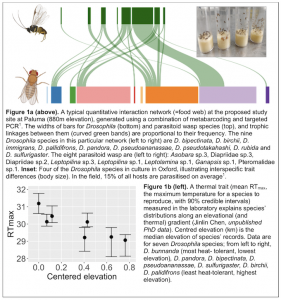Thermal community ecology and the effects of climate change on ecological networks
We are developing an exciting new research theme in experimental community ecology and global change, focusing on rainforest Drosophila and their parasitoids.
With this system, we have been able to link field-based observations and experiments to powerful laboratory experiments. We have established cultures of eight species of rainforest Drosophila and four of their parasitoids in Oxford, and can investigate their ecology in highly-replicated experiments, either in isolation or in combinations that closely replicate natural communities. Our fieldwork has documented the realised niches of individual species along elevational and latitudinal gradients, as well as the structure of the food webs linking them. We can now understand these species distributions and food web structures mechanistically, using laboratory-based measures of population growth when species occur either in isolation, or in the presence of competitors and parasitoids. A key determinant of species distributions and performance is temperature, and we can also explore how thermal tolerances interact and trade-off with host-parasitoid interactions.

Among the many exciting topics that we plan to address with this system are the relationships between food web complexity and stability; the response of species interaction networks to climate change, invasive species and species extinctions; within-species local adaptation to the biotic and abiotic environment and its consequences at the community level; and the role of traits and intraspecific trait variability in allowing species to co-occur within the framework of modern coexistence theory. In the longer term, we hope to use an experimental evolution approach to explore how whole food webs (and the genomes of the interacting species within them) respond to climate change over multiple generations.
Study systems and sites
Fieldwork (including manipulative field experiments) within this theme occurs in Queensland, Australia. Laboratory work takes place in Oxford and the Czech Republic.
Funding
Work on this theme is funded by NERC.
Key people
Owen Lewis
Jinlin Chen
Chris Terry
Lexie Edwards
Collaborators
Prof John Bridle, University College London
Dr Megan Higgie, James Cook University
Prof Ary Hoffmann, University of Melbourne
Dr Jan Hrček, Czech Academy of Sciences
Key publications
Molecular analyses reveal consistent food web structure with elevation in rainforest Drosophila – parasitoid communities. Ecography, doi.org/10.1111/ecog.
Chen, J. & Lewis, O.T. (2022). Factors determining distributions of rainforest Drosophila shift from interspecific competition to high temperature with decreasing elevation. BioRxiv, doi: https://doi.org/10.1101/2022.04.01.486700
Thierry, M., Pardikes, N.A., Lue, C-H., Lewis, O.T. & Hrček, J. (2021). Experimental warming influences species abundances in a Drosophila host community through direct effects on species performance rather than altered competition and parasitism. PLOS ONE, 16(2): e0245029.
Terry, J.C., Chen, J. & Lewis, O.T. (2021). Natural enemies have inconsistent impacts on the coexistence of competing species. Journal of Animal Ecology, DOI: 10.1111/1365-2656.13534.
Lue, C.-H., Buffington, M.L., Scheffer, S., Lewis, M., Elliott, T.A., Lindsey, A.R.I., Driskell, A., Jandova, A., Kimura, M.T., Carton, Y., Kula, R.R., Schlenke, T.A., Mateos, M., Govind, S., Varaldi, J., Guerrieri, E., Giorgini, M., Wang, X., Hoelmer, K., Daane, K.M., Abram, P.K., Pardikes, N.A., Brown, J.J., Thierry, M., Poirié, M., Goldstein, P., Miller, S.E., Tracey, W.D., Davis, J.S., Jiggins, F.M., Wertheim, B., Lewis, O.T., Leips, J., Staniczenko, P.P.A., Hrcek, J. (2021). DROP: Molecular voucher database for identification of Drosophila parasitoids. Molecular Ecology Resources, 21: 2437-2454. DOI: 10.1111/1755-0998.13435.

